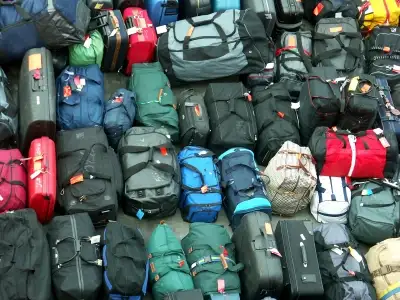
Part of the reason airlines love ancillary fees is that they’re not taxed. Some fees, such as the “peak travel” surcharges, which are essentially part of your ticket, are subject to the 7.5 percent excise tax levied against fares. But ancillary fees such as checked-bag fees are not considered by the IRS to be related to the transport of a person, and therefore not taxed at all.
Anyone who’s ever flown would likely suggest this is a fundamental misunderstanding of the traveling experience. Of course checked bags are related to the transport of a person! Would any reasonable traveler take a weeklong trip without a few changes of clothes? (Hmm … don’t answer that.)
Thing is, the Federal Aviation Administration (FAA) could use some extra revenue. The Government Accountability Office (GAO) just released a study outlining both the decline of the FAA’s Airport and Airway Trust Fund and the subsequent untaxed rise of bag fee revenue, concluding that taxing bag fees alone could increase Trust Fund revenues by 1 or 2 percent. The GAO acknowledged that this is a small number, but cited recent trends, notably a 33 percent rise in bag fee revenue so far this year, to suggest greater revenue potential down the road.
Naturally, the airlines oppose taxing fees. Spirit CEO Ben Baldanza told the House Subcommittee on Aviation that taxing fees “will … raise prices for all consumers and thereby dampen travel demand and likely result in less total government excise tax revenue.” He complained that “as a group, low-fare carriers already pay a greater percentage of the total ticket cost in taxes than do the higher fare legacy carriers.” Southwest Senior VP of Marketing and Revenue Management Dave Ridley concurred, telling the House Subcommittee on Aviation that the industry is overtaxed enough.
But for all the airline bellyaching, it would likely be consumers footing the tax bill. Consumers cover the cost of the current slew of government taxes, including the 7.5 percent excise tax, $3.70 flight segment tax, and $10 (maximum) September 11 Security Fee, as well as a $4.50 (maximum) passenger facility charge at some airports. Presumably any tax on fees would function similarly to the excise tax on tickets, making that $23 bag fee a $24.73 fee.
Still, airlines have plenty of motivation to resist taxes on ancillary fees. Such a tax would certainly deter customers from choosing the services associated with the fee, thus cutting into the airlines’ revenues. Spirit’s Baldanza in particular has reason to fear this outcome, given his airline’s low-fare, fees-for-everything model. And if the IRS figured out a way to make the airlines pay extra taxes on ancillary fee revenue, look out. The airlines already pay income taxes (which, presumably, cover the revenue from bag fees), as well as payroll and fuel taxes, and would not welcome a new tax.
That said, it seems unlikely the fees would vanish if taxes were applied. Sure, it would cut into the airlines’ revenues, but that income would not dry up to the extent that keeping the fees wouldn’t be worthwhile.
Readers, what do you think about this? Should the tax situation stay as it is? Should consumers or the airlines kick in an extra $1 or $2 when checking bags?
We hand-pick everything we recommend and select items through testing and reviews. Some products are sent to us free of charge with no incentive to offer a favorable review. We offer our unbiased opinions and do not accept compensation to review products. All items are in stock and prices are accurate at the time of publication. If you buy something through our links, we may earn a commission.
Related
Top Fares From
Today's Top Travel Deals
Brought to you by ShermansTravel
Kenya: 14-Night Tour, Incl. Tanzania &...
smarTours
 vacation
$7125+
vacation
$7125+
7-Night Bermuda Cruise From Round-Trip Cruise...
Norwegian Cruise Line
 cruise
$1036+
cruise
$1036+
Ohio: Daily Car Rentals from Cincinnati
85OFF.com
 Car Rental
$19+
Car Rental
$19+



